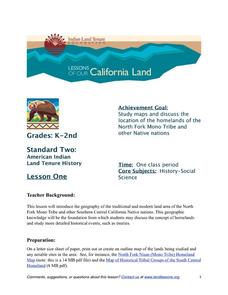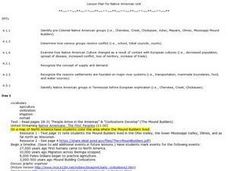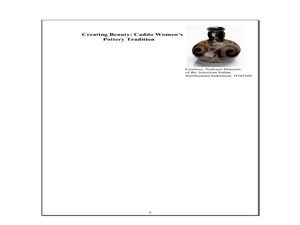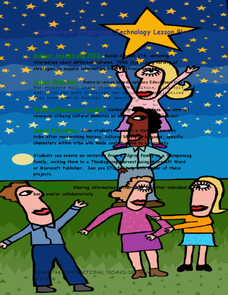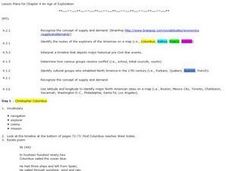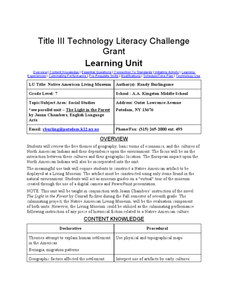Curated OER
The First North Americans
Students identify and interpret the different North American Indian groups, by region, and the type and impact of their interaction with Europeans.
Then they complete an overview of one main Native American group during the age of...
Curated OER
American Indians
Eighth graders discuss their country of origin and form work groups based on their answers. In this American Indian lesson, 8th graders locate their country of origin to the lifestyle, products and living arrangements...
US Citizenship and Immigration Services
Thanksgiving 1—Pilgrims and American Indians
The Pilgrims first arrived in America in order to gain religious freedom. Here is a lesson that takes the class on this journey with the Pilgrims, stopping to look at how they got here, who they met when they arrived, and a peek into...
Indian Land Tenure Foundation
Maps and Homelands
You are never too young to learn about maps. To better understand the concept of a homeland, students work together to construct a map of their local area out of paper puzzle pieces. They'll put the maps together and then add details by...
Curated OER
Pre-Colonial Native American Groups
Students investigate U.S. history by researching the Internet and taking a test. In this American Indian group lesson plan, students identify the many specific Native American tribes and their geographic locations. Students research the...
Curated OER
Pre-Columbian Cultures in the Americas
Native American studies is fun, educational, and highly motivating. Fifth graders will gain a deeper understanding of the six major pre-Columbian culture areas on the North American continent. They will choose one group and conduct...
Jamestown-Yorktown Foundation
How Did Relations between Britain and the Colonies Change after the French and Indian War?
What does the French and Indian War have to do with the American Revolution? Following the war, Britain issued the Proclamation of 1763 in an attempt to limit the colonists' western expansion. To understand how the proclamation, the...
National Endowment for the Humanities
Empire and Identity in the American Colonies
The American Revolution was born out of a European conflict that spilled over into North America—and the documents prove it! Using primary sources from the era of the French and Indian War, including British plans to try to unite its...
Curated OER
Children's Literature Across the Curriculum Ideas-Dancing With the Indians
Students read Dancing With the Indians by Angela Shelf Medearis. They complete a variety of cross-curricular activities surrounding the study of Native American festivals and traditions. Included are reading, art, math, science, writing,...
Curated OER
American Indians, European Settlers, and Colonial Arkansas
Pupils identify the interdependence among various ethnic groups in early Arkansas history. They illustrate timelines and visit historic sites. They make maps of the site and give class presentations.
National Museum of the American Indian
The A:Shiwi (Zuni) People: A Study in Environment, Adaptation, and Agricultural Practices
Discover the connection of native peoples to their natural world, including cultural and agricultural practices, by studying the Zuni people of the American Southwest. This lesson plan includes examining a poster's photographs,...
Curated OER
Choosing Sides: The Native Americans' Role in the American Revolution
High schoolers analyze the different roles assumed by various Native American tribes during the American Revolution. They examine the issues involved for Native Americans in choosing the British or the American side of the conflict, such...
Curated OER
First Nations vs. Euro-Americans
Students analyze primary and secondary source documents to help them describe the cooperation and conflict that existed among the American Indians and new settlers. Then, students analyze the purpose, challenges, and economic incentives...
Stanford University
Edward Curtis Photographs
A picture is worth a thousand words. The photos of Edward Curtis capture the life and culture of Native American Tribes during the early part of the twentieth century. A presentation first gives background information on Edward Curtis...
Curated OER
Indian Women in Texas History
Fourth graders study Indian women in Texas. In this US history instructional activity, 4th graders discuss what each Indian woman's contribution was by completing a timeline and table. Students examine the Caddo Women's...
Curated OER
Native Americans
First graders explore the lifestyles of several North American tribes. They investigate about the homes, food, transportation, and daily living habits of each tribe. Pupils use a map to locate several Native American tribes in North...
K20 LEARN
Worcester v. Georgia: Cherokee Sovereignty and Actions of the U.S. Government
Young historians study the Supreme Court case "Worcester v. Georgia" and note instances where the Justices defended the sovereign rights of the Cherokee. They also examine the actions of President Andrew Jackson and the...
Curated OER
Southeastern Native Americans' Lifestyles
Learners complete activities to learn about Southeastern Native Americans. In this lifestyles lesson, students watch a PowerPoint about Southeastern Native Americans, view artifacts from the region and discuss the objects with a...
Curated OER
An Age of Exploration
Students investigate U.S. history by examining North American timelines. In this American exploration lesson, students research the events that led to Columbus finding America and participate in a jeopardy game regarding his adventure....
Smithsonian Institution
We Have a Story to Tell: Native Peoples of the Chesapeake Region
How did colonial settlement and the establishment of the United States affect Native Americans in the Chesapeake region? Your young historians will analyze contemporary and historical maps, read informational texts, and work in groups to...
Curated OER
Christopher Columbus: The Man, the Myth, the Legend
Learn more about maps by examining Christopher Columbus's voyage to the New World. Kindergartners will learn about basic map skills and how to identify the compass rose, oceans, and land masses. They will also discover the purpose of...
Curated OER
Cultural Lit. 19: Old Spanish Trail & Native Americans
Fifth graders name the American Indian people by tribe who lived in the lands which the Old Spanish Trail traversed. They investigate and describe some impacts of western expansion upon the American Indians.
Curated OER
Cultural Lit. 18: The Oregon Trail & Native Americans
Fifth graders name the American Indian people by tribe who lived in the lands which the Oregon Trail traversed. They investigate and describe some impacts of western expansion upon the American Indians.
Curated OER
Native American Living Museum
Seventh graders complete a unit of lessons on Native Americans. They analyze Native American cultures, create a Native American artifact for a Living Museum, and develop a tour of the museum using a digital camera and a Powerpoint...





